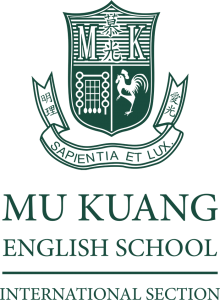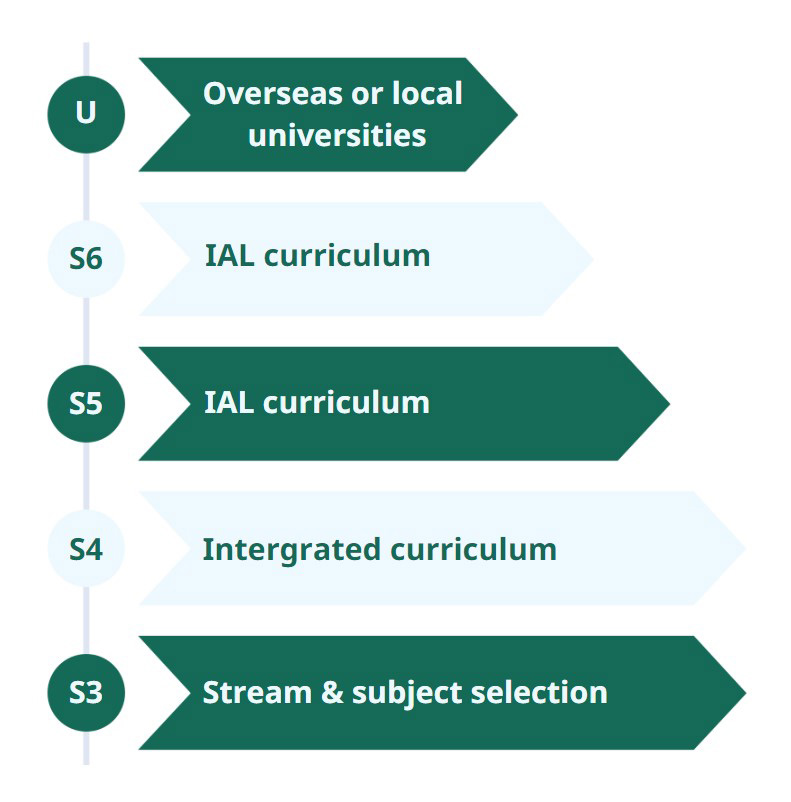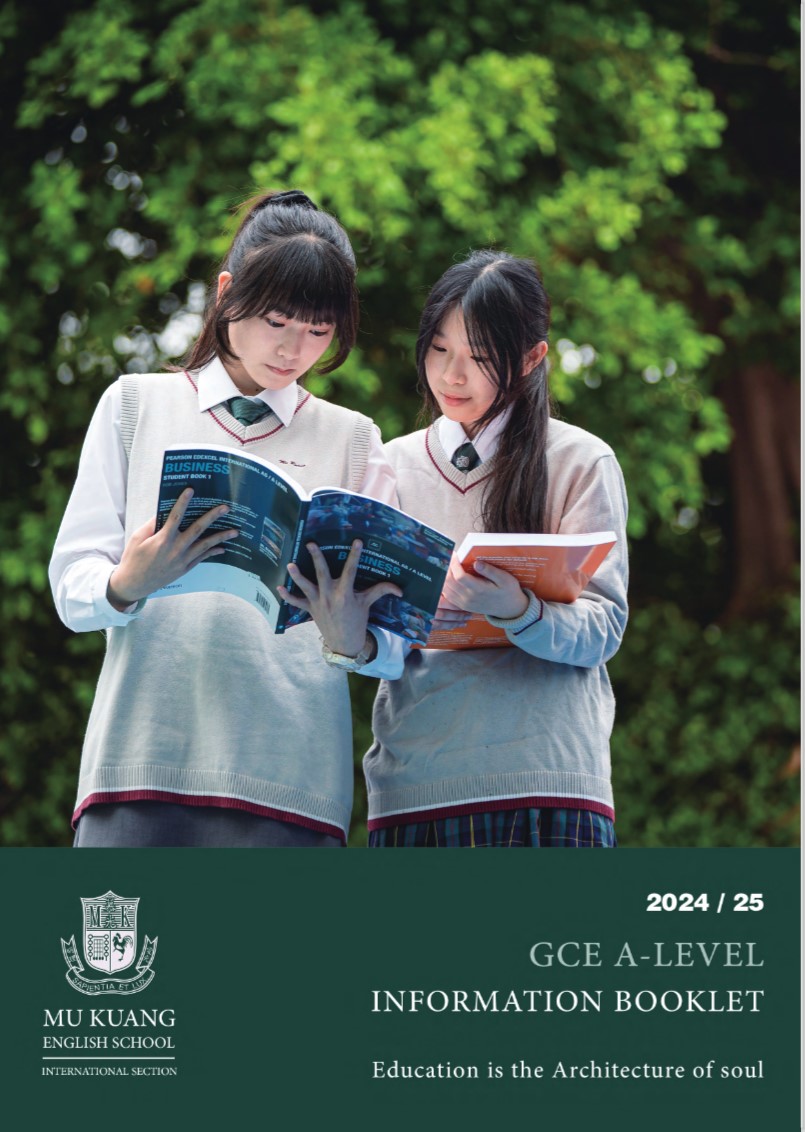Welcome To
Mu Kuang English School non-local-curriculum
Class Size
One Class of about 30 Students.

Reasons for offering the non-local curriculum IAL
- To provide alternative educational opportunities that align with international standards
- To prepare students for higher education and global careers
- To diversify MKES’ senior curriculum with multiple pathways
- To promote internationalisation in MKES
- International Advanced Level (IAL) is globally recognised, academically rigorous and flexible



The Career Immersion program
The Career Immersion program aims to connect students with real-world work settings, taking them beyond the classroom to expand their knowledge and understanding of different industries. Through these hands-on experiences, students will learn about a variety of careers and gain insight into employers’ expectations.
The immersion experiences also allow students to enhance their essential skills, such as in communication, problem-solving, and teamwork. Additionally, students will develop workplace etiquette and values that will help them adapt to the professional world.
Ultimately, the Career Immersion program prepares students for their future careers by giving them a practical understanding of the workplace. This helps ensure they are well-equipped to transition from school to the professional environment.

IAL curriculum
Mu Kuang offers the international curriculum, GCE IAL Examinations, at S5 and S6. IAL is a widely recognised international qualification, taken in over 125 countries, and is accepted as proof of academic ability for entry to universities worldwide. The syllabuses develop a deep understanding of subjects and independent thinking skills. All the IAL subjects offered are administered by either the University of Cambridge International Examinations (CIE) or Pearson Edexcel (Edexcel).

2-Year curriculum
S4 School-Based Integrated Curriculum
IELTS – the International English Language Testing System
- Widely accepted as proof of proficiency in English including the UK, US, Canada, Australia and Hong Kong
- Valid for 2 years
- Can be taken multiple times
- IELTS One Skill Retake was introduced in 2023, which allows a test taker to retake any one section (Listening, Reading, Writing and Speaking) of the test
- IELTS is approved by UK Visas and Immigration (UKVI) as a Secure English Language Test for visa applicants both outside and inside the UK.
Subject Clusters
International Examinations : IAL
- IAL exam is administered by Pearson Edexcel, which is a British examining and reward body and recognised globally.
- Edexcel IAL qualifications are recognised by local and international universities worldwide.
- We will present students in IAL examinations through the HKEAA, which conducts the exams twice a year: January and May / June
Science stream 1: Chemistry + Physics + Biology
- Good at Physics, English and Mathematics in S3; with an analytical mindset.
- Good at Chemistry in S3
- Good at Biology in S3
- “Physics” – The curriculum covers the major topics in Physics, including mechanics, materials, waves, electricity, fields, thermodynamics, radiation, particles, oscillations and cosmology.
- “Chemistry” – Students will develop their knowledge and understanding of chemistry by applying the concepts to a range of different problems, set in a variety of contexts. Students will need to apply mathematical skills to the problems.
- “Biology” – The curriculum covers the major topics in biology, including biological molecules, diet, transport, health, cells, development, biodiversity, conservation, energy, the environment, microbiology, immunity, respiration, the internal environment, coordination and gene technology.
Science stream 2: Chemistry + Physics + Mathematics
- Good at Physics, English and Mathematics in S3; with an analytical mindset.
- Good at Mathematics in S3;with an analytical mindset.
- Good at Chemistry in S3
- “Physics” – The curriculum covers the major topics in Physics, including mechanics, materials, waves, electricity, fields, thermodynamics, radiation, particles, oscillations and cosmology.
- “Chemistry” – Students will develop their knowledge and understanding of chemistry by applying the concepts to a range of different problems, set in a variety of contexts. Students will need to apply mathematical skills to the problems.
- “Mathematics” – The curriculum covers the major topics in mathematics, including algebra and functions; coordinate geometry in the (x,y); trigonometry; differentiation; integration, proof; sequences and series; exponentials and logarithms; trigonometry; differentiation; integration; numerical methods, binomial expansion; vectors.
Mixed stream Economics + Physics + Mathematics
- Good at Physics, English and Mathematics in S3; with an analytical mindset.
- Good at Mathematics in S3;with an analytical mindset.
- Good at Economic in S3
- “Physics” – curriculum covers the major topics in Physics, including mechanics, materials, waves, electricity, fields, thermodynamics, radiation, particles, oscillations and cosmology.
- “Economic” – The specification is split into two main sections, the first section introduces students to microeconomic issues and the second section covers mainly macroeconomic issues. However, students should appreciate that microeconomics and macroeconomics are not entirely distinct areas of study. For example, microeconomic principles often provide fundamental insights into understanding aspects of the macroeconomy. Similarly, economic issues and problems often contain both a microeconomic and macroeconomic dimension.
- “Mathematics” – The curriculum covers the major topics in mathematics, including algebra and functions; coordinate geometry in the (x,y); trigonometry; differentiation; integration, proof; sequences and series; exponentials and logarithms; trigonometry; differentiation; integration; numerical methods, binomial expansion; vectors.
Economics stream 1: Economics + Business + Biology
- Good at Biology in S3
- Good analytical mindset.
- Good at Economic in S3
- “Business” – This course will provide you with a good overview of business as a whole, with a particular focus on enterprise. You will also learn about four business areas: marketing, finance, people management and operations. Your study will also involve strategic thinking about business influences and setting up a small business.
- “Economic” – The specification is split into two main sections, the first section introduces students to microeconomic issues and the second section covers mainly macroeconomic issues. However, students should appreciate that microeconomics and macroeconomics are not entirely distinct areas of study. For example, microeconomic principles often provide fundamental insights into understanding aspects of the macroeconomy. Similarly, economic issues and problems often contain both a microeconomic and macroeconomic dimension.
- “Biology” – The curriculum covers the major topics in biology, including biological molecules, diet, transport, health, cells, development, biodiversity, conservation, energy, the environment, microbiology, immunity, respiration, the internal environment, coordination and gene technology.
Economics stream 2: Economics + Business + Mathematics
- Good at Mathematices in S3
- Good analytical mindset.
- Good at Economic in S3
- “Business” – This course will provide you with a good overview of business as a whole, with a particular focus on enterprise. You will also learn about four business areas: marketing, finance, people management and operations. Your study will also involve strategic thinking about business influences and setting up a small business.
- “Economic” – The specification is split into two main sections, the first section introduces students to microeconomic issues and the second section covers mainly macroeconomic issues. However, students should appreciate that microeconomics and macroeconomics are not entirely distinct areas of study. For example, microeconomic principles often provide fundamental insights into understanding aspects of the macroeconomy. Similarly, economic issues and problems often contain both a microeconomic and macroeconomic dimension.
- “Mathematics” – The curriculum covers the major topics in mathematics, including algebra and functions; coordinate geometry in the (x,y); trigonometry; differentiation; integration, proof; sequences and series; exponentials and logarithms; trigonometry; differentiation; integration; numerical methods, binomial expansion; vectors.
Application Form
Please download, print and complete the form. Click HERE
Submission of Application
Application cannot be processed unless all required documents have been submitted. Please ensure that all information provided is accurate and complete.
- A completed application form;
- A copy of the applicant’s HKID Card;
- Copies of students’ academic reports from current and previous school years; (e.g., for the S.4 application, please submit S.3 and S.2 academic reports.)
- A non-refundable and non-transferable application fee of HK$200.00 Cash (in person) or in Cheque (by post) payable to “The IMC of Mu Kuang English School”.
Only hard copy applications are accepted.
An entrance test and Interview will be arranged for potential candidates from late June to mid-July. Successful candidates will be notified of the results in July.
Applicants will be informed of the above through the email indicated on their application form.
For enquiries, please contact our General Office at 2341 2932 or via email (ial@mukuang.edu.hk)


